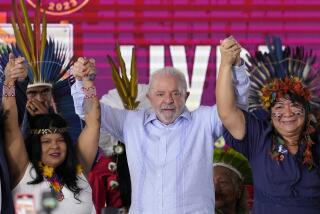Inexperienced Albania Striving for Democracy
- Share via
TIRANA, Albania — Communism has fallen, but that doesn’t mean democracy is assured in a country with no experience of it.
Critics of President Sali Berisha say Albania is sliding back toward authoritarianism. His defenders counter that, after 46 years of isolation and Stalinist rule, only a strong presidency can lead the country into the modern world.
Among questions that propel the debate are how democratic Albania has become and whether political revenge and a personality cult developing around Berisha could become dominant.
“We are living in a post-Communist society (but) are not in a democratic society,” said Gramoz Pashko, who founded the Democratic Party with Berisha, a former cardiologist, then split with him. Pashko now belongs to the opposition Democratic Alliance.
Dylber Vrioni of the Democratic Party leadership said a strong president is vital now, and that “real political competition can begin only after Albania becomes self-sufficient.”
The problem of self-sufficiency is real: Most Albanians survive on food shipped in from abroad. Many acknowledge that continuing such aid hinders private initiative.
A total of $1 million a day is said to be sent home by an estimated 250,000 Albanians working in Greece and 30,000 in Italy. The government has not issued precise unemployment statistics, but the unemployment rate is estimated at 50% to 70%.
In Tirana, the only people who seem to work regularly are hundreds of street vendors, employees of the bread factory and open-air money changers, who deal in foreign currencies just outside the national bank.
Officials of the governing party insist that private initiative is taking root, annual inflation has been reduced to less than 300% and newspapers can publish what they want.
Neretan Ceka, chairman of the opposition Democratic Alliance, contends that the Democratic Party’s only goal is to stay in power.
Berisha “is on TV almost every day,” Ceka said. “He wants to control everything, including who will be the driver for a given minister.”
Kico Blushi, an Albanian writer, accuses Berisha of creating a personality cult like that of Enver Hoxha, the Stalinist dictator who ruled Albania for four decades, until his death in 1985.
Others say Berisha has surrounded himself with “yes men” rather than independent specialists, who are in short supply because of the decades of isolation.
Prominent opposition figures complain of telephone tapping, examination of mail and even police surveillance. Such allegations are less severe, however, in a country where people often tap into a neighbor’s wire in order to call free and mail sometimes either disappears or arrives open or mangled.
Maxim Haxhia, the former prosecutor-general, said Berisha fired him for opposing nighttime searches of homes for illegal weapons, but he still expressed a generally favorable view of the president.
“He is uncorrupted, an honest man . . . very hard-working,” Haxhia said in an interview. “But it is very unfortunate that he wants to do everything himself. His staff is the worst--incapable people who destroy his public image day by day,”
Neshat Tozaj, another writer, criticized Berisha’s party for “identifying itself with the state” in a carry-over from Communist days.
Many Albanians do not seem to mind, after decades of looking up to King Zog, Hoxha and now Berisha, that the mass media have yet to escape government control.
Asked why state media largely ignore the political opposition, Vrioni, the ruling party official, said: “We’re being criticized from all sides. We have to protect ourselves or else we would be powerless.”
More to Read
Sign up for Essential California
The most important California stories and recommendations in your inbox every morning.
You may occasionally receive promotional content from the Los Angeles Times.












